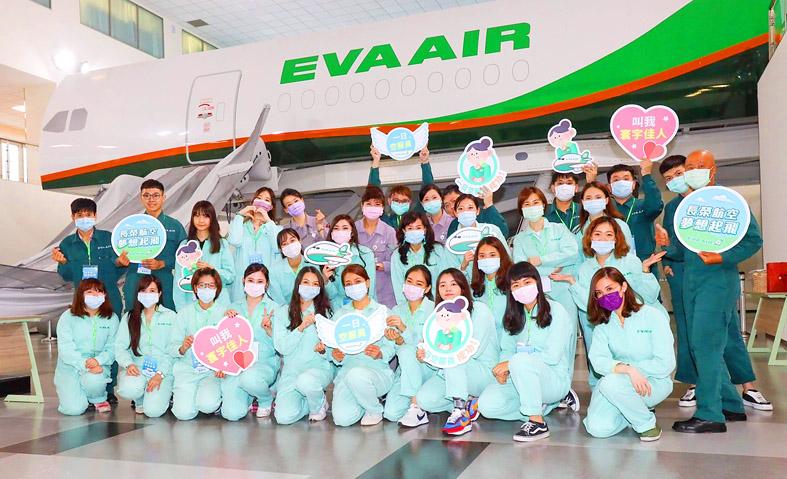EVA Airways Corp (長榮航空) expects the delivery of three new Boeing 777F cargo jets in the fourth quarter, as it aims to boost its cargo business, the airline said on Thursday last week.
The airline previously expected to receive the first two of three planes in that quarter, but Boeing Co has agreed to also deliver the third jet by the end of this year, EVA president Clay Sun (孫嘉明) told an investors’ conference.
That would significantly boost EVA’s cargo capacity, as the airline currently has five cargo jets, compared with 18 cargo planes owned by its domestic rival, China Airlines Ltd (中華航空), the airline said.

Photo courtesy of EVA Airways Corp
EVA’s air cargo load factor last quarter rose to 94.6 percent last quarter, up 16 percentage points from a year earlier, Sun said.
Due to a decline in passenger numbers and a booming air cargo business, EVA in September last year canceled orders for seven Boeing 787-10 Dreamliner passenger jets, replacing them with orders for three 777F cargo aircraft and four smaller 787-9 passenger jets.
“We have asked Boeing to delay delivering the passenger aircraft, as we do not need so much passenger capacity,” Sun said, adding that the passenger aircraft might be delivered next year at the earliest.
It might take three to four years for the passenger business to fully rebound to pre-COVID-19 pandemic levels, it said, adding that passenger numbers might start recovering in the second half of this year.
As the government has allowed international passenger transfers at Taiwan Taoyuan International Airport from March 1, EVA would adjust its schedule with focus on this group of travelers, Sun said.
EVA reported revenue from its passenger business of NT$1.7 billion (US$60.47 million) last quarter, down 91 percent year-on-year, with its load factor halving to 17 percent, the airline said, adding that 61 percent of its passenger revenue came from routes to North America.
Cargo revenue advanced 138 percent annually to NT$15.2 billion last quarter, with the total cargo weight rising 43 percent to 200,000 tonnes, it said.

When Lika Megreladze was a child, life in her native western Georgian region of Guria revolved around tea. Her mother worked for decades as a scientist at the Soviet Union’s Institute of Tea and Subtropical Crops in the village of Anaseuli, Georgia, perfecting cultivation methods for a Georgian tea industry that supplied the bulk of the vast communist state’s brews. “When I was a child, this was only my mum’s workplace. Only later I realized that it was something big,” she said. Now, the institute lies abandoned. Yellowed papers are strewn around its decaying corridors, and a statue of Soviet founder Vladimir Lenin

UNIFYING OPPOSITION: Numerous companies have registered complaints over the potential levies, bringing together rival automakers in voicing their reservations US President Donald Trump is readying plans for industry-specific tariffs to kick in alongside his country-by-country duties in two weeks, ramping up his push to reshape the US’ standing in the global trading system by penalizing purchases from abroad. Administration officials could release details of Trump’s planned 50 percent duty on copper in the days before they are set to take effect on Friday next week, a person familiar with the matter said. That is the same date Trump’s “reciprocal” levies on products from more than 100 nations are slated to begin. Trump on Tuesday said that he is likely to impose tariffs

HELPING HAND: Approving the sale of H20s could give China the edge it needs to capture market share and become the global standard, a US representative said The US President Donald Trump administration’s decision allowing Nvidia Corp to resume shipments of its H20 artificial intelligence (AI) chips to China risks bolstering Beijing’s military capabilities and expanding its capacity to compete with the US, the head of the US House Select Committee on Strategic Competition Between the United States and the Chinese Communist Party said. “The H20, which is a cost-effective and powerful AI inference chip, far surpasses China’s indigenous capability and would therefore provide a substantial increase to China’s AI development,” committee chairman John Moolenaar, a Michigan Republican, said on Friday in a letter to US Secretary of

Taiwan Semiconductor Manufacturing Co’s (TSMC, 台積電) market value closed above US$1 trillion for the first time in Taipei last week, with a raised sales forecast driven by robust artificial intelligence (AI) demand. TSMC saw its Taiwanese shares climb to a record high on Friday, a near 50 percent rise from an April low. That has made it the first Asian stock worth more than US$1 trillion, since PetroChina Co (中國石油天然氣) briefly reached the milestone in 2007. As investors turned calm after their aggressive buying on Friday, amid optimism over the chipmaker’s business outlook, TSMC lost 0.43 percent to close at NT$1,150